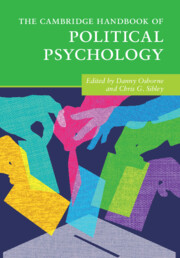Book contents
- The Cambridge Handbook of Political Psychology
- The Cambridge Handbook of Political Psychology
- Copyright page
- Dedication
- Contents
- Figures
- Tables
- Contributors
- Part I Foundations of Political Psychology
- Part II The Politics of Intergroup Attitudes
- Part III Contemporary Challenges to Democracy
- 23 The Political Psychology of Inequality
- 24 How Social Class Influences Political Choices
- 25 Fear and Loathing in American Politics
- 26 Political Extremism
- 27 The Politics of Hate
- 28 Populism
- 29 A Cultural Theory of Autocracy-vs-Democracy
- 30 Psychological Theories Meet the Challenge of Persuading and Mobilising Voters
- 31 Collective Action for Social Change
- 32 Opinion Formation and Polarisation in the News Feed Era
- 33 Conspiracy Theory Belief and Conspiratorial Thinking
- 34 Political Psychology and the Climate Crisis
- 35 The Political Psychology of Cyberterrorism
- 36 Reconciliation in the Aftermath of Collective Violence
- Part IV Diversifying Perspectives in Political Psychology
- Index
- References
27 - The Politics of Hate
Derogatory Language in Politics and Intergroup Relations
from Part III - Contemporary Challenges to Democracy
Published online by Cambridge University Press: 17 February 2022
- The Cambridge Handbook of Political Psychology
- The Cambridge Handbook of Political Psychology
- Copyright page
- Dedication
- Contents
- Figures
- Tables
- Contributors
- Part I Foundations of Political Psychology
- Part II The Politics of Intergroup Attitudes
- Part III Contemporary Challenges to Democracy
- 23 The Political Psychology of Inequality
- 24 How Social Class Influences Political Choices
- 25 Fear and Loathing in American Politics
- 26 Political Extremism
- 27 The Politics of Hate
- 28 Populism
- 29 A Cultural Theory of Autocracy-vs-Democracy
- 30 Psychological Theories Meet the Challenge of Persuading and Mobilising Voters
- 31 Collective Action for Social Change
- 32 Opinion Formation and Polarisation in the News Feed Era
- 33 Conspiracy Theory Belief and Conspiratorial Thinking
- 34 Political Psychology and the Climate Crisis
- 35 The Political Psychology of Cyberterrorism
- 36 Reconciliation in the Aftermath of Collective Violence
- Part IV Diversifying Perspectives in Political Psychology
- Index
- References
Summary
Hate speech is a form of communication that targets disadvantaged social groups in a harmful way. It can be seen as a driving force behind the successes of numerous populist politicians and extremist movements. In this chapter, we argue that studying hate speech can be crucial for a better understanding of political mobilisation, intergroup relations, and social media. We describe the role of hate speech in mobilising electoral support and violence, in the promotion of racism and prejudice, as well as in shaping attitudes towards government policies. We uncover how political ideology and hate speech are interconnected, and that the left-right political beliefs do not always explain why individuals turn to use hate speech. We also outline the dilemma between the protection against hate speech and the freedom of expression principles, that are at the core of current debates on derogatory language.
- Type
- Chapter
- Information
- The Cambridge Handbook of Political Psychology , pp. 429 - 441Publisher: Cambridge University PressPrint publication year: 2022
References
- 4
- Cited by

